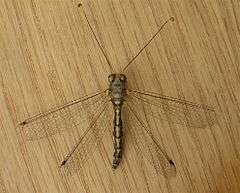Ascalaphinae
| Split-eyed owlflies | |
|---|---|
 | |
| Suhpalacsa subtrahens | |
| Scientific classification | |
| Kingdom: | Animalia |
| Phylum: | Arthropoda |
| Class: | Insecta |
| Order: | Neuroptera |
| Family: | Ascalaphidae |
| Subfamily: | Ascalaphinae |
| Genera | |
|
Several, see text | |
The Ascalaphinae are the namesake subfamily of the owlfly family (Ascalaphidae), winged insects of the order Neuroptera. Most are found in the tropics. Their characteristic apomorphy is the ridge which divides each of their huge compound eyes; they are thus known as split-eyed owlflies.
Like the other owlflies, they are insectivores. Imagines are cumbersome fliers and lack the strong mouthparts of dragonflies (which owlflies resemble at first glance, despite being not at all closely related insects) or other decidedly predatory insects, they are restricted to small and defenseless prey. The larvae on the other hand resemble antlions in appearance and habits and are voracious ambush predators, able to tackle prey like ants that will not be eaten without a struggle.
The split-eyed owlflies form one of the two main lineages of living Ascalaphidae, the other being the Haplogleniinae which have unsplit eyes like their ancestors. The first fossil record of the Ascalaphinae dates to the Miocene, and the subfamily thus probably evolved in the latter half or towards the end of the Paleogene.[1]
-
Ascalaphus sinister Walker, 1853, male
-

Ascalaphus sinister Walker, 1853, female
-

Glyptobasis sp. male
-

Glyptobasis sp. female
Selected genera
- Ascalaphus (= Libelloides)
- Pseudoptynx
- Suhpalacsa Lefèbvre, 1842
- Ululodes
Footnotes
- ↑ See references in Haaramo (2008)
References
| Wikimedia Commons has media related to Ascalaphinae. |
- Haaramo, Mikko (2008): Mikko's Phylogeny Archive: Neuroptera. Version of 2008-MAR-11. Retrieved 2009-APR-07.